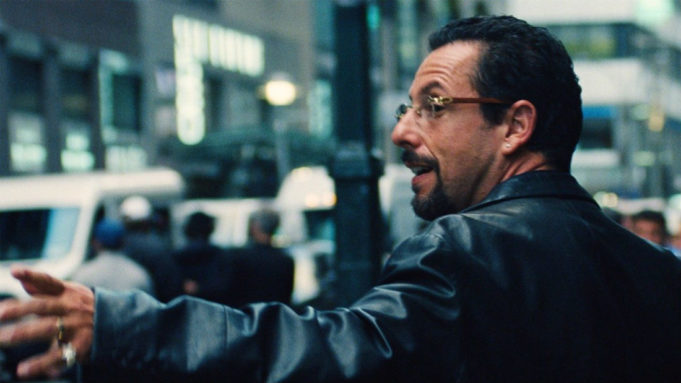Sometimes, it’s really fun to be the guy saying that the Christmas movie riding a wave of positive buzz is terrible. Uncut Gems is not one of those times. It would be if I thought this unrelenting thriller was a bad movie, but it isn’t. On the contrary, it’s remarkable in many ways, and yet undoubtedly it got on my nerves.
The story is set in the spring of 2012. Adam Sandler plays Howard Ratner, a jeweller who owns a shop in New York’s Diamond District. His store is on a second floor behind a nondescript wooden door, but that’s about the only thing inconspicuous about the reflective sunglasses-wearing Howard, whose Twitter handle is @howiebling. Shady methods have brought a rare uncut black opal into his possession, which he has valued at a minimum of $800,000. Who would be rich enough to buy such a stone? NBA superstar Kevin “KG” Garnett (who portrays himself — brilliantly, it should be said), who takes the rock out on loan and proceeds to have a big game in the playoffs, cementing his belief that the stone possesses good mojo for him.
A prologue set in Ethiopia shows a miner mangling his leg after finding the black opal, which would seem to imply that the gem is cursed, except that the gambling-addicted Howard doesn’t appear to need any help destroying himself. He is a lowlife of a specifically Jewish sort — his fellow Jews would probably call him a schnorrer — but I dare say that many people from other minority communities know someone of his type: a guy constantly on the make, without an off switch, who doesn’t know how to play it cool or dress for a formal gala, the sort of operator whom classier immigrants with college degrees and such are supposed to be ashamed of. Howard’s wife (Idina Menzel) openly detests him, partly because he’s having an affair with a sales clerk named Julia (Julia Fox), and is planning to leave him after Passover. Garnett leaves his NBA championship ring with Howard as collateral for the opal, and Howard immediately turns around and pawns the ring for cash to bet on KG’s Boston Celtics. Even though that bet hits, he is constantly in debt, because he makes all these schemes and never considers the possibility that they might fail.
This is the work of the brothers Josh and Benny Safdie, and if you’ve seen either of their previous films, Heaven Knows What and Good Time, you know that this is what they do: stories of desperate New Yorkers running pell-mell over town with life and death as their stakes. The Safdies know the Diamond District because their father worked there, and they lay out this famously scruffy block amid the glitz of midtown Manhattan with great specificity. Other filmmakers such as Martin Scorsese and Sidney Lumet have captured the amount of chaos that one person can experience and cause other people in New York, and the Safdies are in that exalted class. Just watch the scene in which a group of pissed-off loan sharks come to Howard’s store to call in his debt. The buzzer-operated security door malfunctions and refuses to open, even though Howard is anxious to let them in, so he and his staffers work feverishly to open the door while the debt collectors stand there growing even more furious. The tension built up in this scene and in other places is harrowing stuff.
Other people have a void at their center, but Howard is the void, and therein lies the problem. His insatiable need for more money (whether through his professional dealings or his sports bets) is all there is to him. Perhaps we don’t need some pat psychological backstory to explain what made him this way, but the script doesn’t give us any other dimensions to him at all. His wife tells him that he’s the most annoying person she’s ever met, and while we can understand how other characters might share in this view, we don’t get any hint of charm to explain what might have attracted her or Julia to him in the first place. He holds his family in little regard, barking out orders to his three kids rather than demonstrating much affection for them. He’s possessive, too, starting a fistfight with The Weeknd (who also portrays himself) when Julia starts cozying up to the singer at a concert. This is a man who needs to own things rather than love them, and the Safdies’ relentless focus on him yields no further insight. The character grows wearying along with the film.
Sandler shares in the blame for this, too. Having played so many boring suburban dads in his middle age, this actor does disappear into the sleazy Howard. He is breathtakingly good in stretches of this film, as in one late scene in his office when Howard comes apart after all his schemes have gone south, as well as another one when he negotiates with KG to buy the stone and manipulates the athlete into paying a favorable price for it. Yet Sandler misses opportunities to bring shadings that the character badly needs. His performance here reminds me of his impression of Eric Bogosian from his Saturday Night Live days. (Bogosian, ironically, shows up here as Howard’s mobbed-up brother-in-law.)
So Uncut Gems misses the mark despite all the things it does right. It’s a movie that I recommend that you see, even though I don’t like it very much. The Safdies are talented enough that I’m confident they’ll make better films. I hope we can say the same for Sandler, who was robbed of an Oscar nomination for Punch-Drunk Love and played an intellectual without visible strain in The Meyerowitz Stories (New and Selected). He deserves a better dramatic showcase than this flawed specimen.
Starring Adam Sandler. Directed by Josh and Benny Safdie. Written by Josh Safdie, Benny Safdie, and Ronald Bronstein. Rated R.













Interesting review. So it seems your dissatisfaction boils down to Sandler’s character is too one-note, there’s no complexity or ambivalence (no positives, just a relentless single negative)?